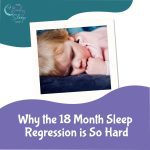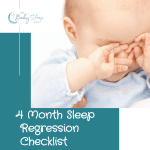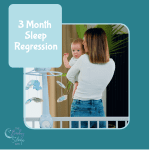
The 4-month sleep regression happens to babies who are around 3 to 4 months old when their sleep patterns change. 4 month old babies going through this regression wake frequently at night and take short naps leaving themselves (and their parents!) exhausted. As a sleep consultant for 15+ years, I have helped countless 4-month-olds sleep better, and here are my tips for you to help your baby.
In This Article:
- What Is a Baby Sleep Regression?
- Why Does the 4 Month Sleep Regression Happen?
- Signs of the 4 Month Sleep Regression
- How Long Does It Last, When Will It End, and Will Your Baby Outgrow It?
- Is the 3-Month Sleep Regression The Same?
- Is the 5-Month Sleep Regression the Same?
- Video: Nicole Johnson, Lead Sleep Consultant Talks Regressions
- How to Stop The 4 Month Sleep Regression Before It Starts
- How To Fix It After The Regression Starts
- 4 Month Old FAQ
What is a Baby Sleep Regression?
Before we can talk about the 4-month sleep regression specifically, we should understand what a sleep regression is in the first place. When parents think of a sleep regression, it means that your baby’s sleep has gotten worse but it will get better in a few weeks. It is usually tied to a developmental milestone and your baby will have a number of them before they turn 3 years old. While sleep regressions are normal, that doesn’t make them less exhausting!
You May Also Be Interested In…
Why Does the 4 Month Sleep Regression Happen?
The 4 month sleep regression happens because your baby’s brain is developing. At 4 months old, your baby will begin to go through sleep cycles just as adults do. While this is a good thing since it means your baby is developing properly, it also means they may wake up frequently at night and/or take short naps.
What Age Does It Start?
The 4-month sleep regression starts between 12 and 20 weeks old.
When Does It End?
The 4-month sleep regression, like most sleep regressions, peak for 3 to 6 weeks, on average. However, since this is a permanent change your baby’s sleep, sleep problems can last for months or, even years!
Signs of the 4 Month Sleep Regression
Signs of the 4-month sleep regression usually include one or more of the following:
- Waking a lot at night (even when they used to sleep in long stretches) – waking every 1 to 2 hours at night is common.
- Taking short naps of 20-30 minutes, sometimes 30-45 minutes.
- Can’t be put down awake (or even asleep sometimes!). Baby wants to sleep only in your arms or a carrier/sling.
- Irritability and Fussiness (though that can be simply due to sleep deprivation!).
- Needing to be put back to sleep the same way each time (e.g. rocking or feeding back to sleep).
These are the most common signs of the 4 month sleep regression we hear from families who reach out to us.
How Long Does It Last, When Will It End, and Will Your Baby Outgrow It?
The exhausting 4 month sleep regression peaks for around 2-3 weeks. Some babies will begin (or go back) to sleeping well while others have sleep habits that need to be actively changed in order to help them sleep better. The regression doesn’t ever “end” in the strictest sense of the word. The 4 month sleep regression marks a permanent change in your baby’s sleeping habits.
Before your baby hit the 4-month mark, your baby’s sleeping patterns were very simple and straightforward. Newborns sleep deeply much of the time. This explains why many (not all!) newborns and very young infants tend to sleep anywhere, through anything!
At about 4 months old, baby brains mature and change! Now, babies are cycling between light and deep sleep more often – just like we adults do. Some babies start this process early around 12 weeks old, making this the “3 month sleep regression” instead!
Is the 3 Month Sleep Regression the Same?
Yes, the 3-month sleep regression is the same as the 4-month sleep regression. 3 month olds sometimes stop sleeping through the night and fight sleep. You are simply a “lucky” parent who has a baby who is developing early in this area. Some babies are 2 months old, some are 3 months old, and most are nearly 4 months old.
Is the 5 Month Sleep Regression the Same?
Yes, again, all babies develop at their own rates. So, while 4 months is the most common age to start this regression, some babies will be 5 months old. This is actually favorable because babies who are a little older are usually more ready to be unswaddled and learn how to self-soothe. More on that below.
How to Stop The 4 Month Sleep Regression Before It Starts
If your baby hasn’t started waking a lot at night or taking short naps, you might be worried they will. To stop the 4 month sleep regression before it starts, it requires you to put your baby down awake and let them fall asleep independently.
The #1 Reason Why Babies Wake Frequently and/or Take Short Naps
The #1 reason babies wake up frequently at night or take short naps is simply due to not being able to put sleep cycles together. This is usually because parents are doing it for them by feeding them to sleep, for example, rocking, bouncing, driving in a car, etc. So, to stop this regression before it starts requires your baby to know how to put themself to sleep without your help or other sleep associations that can be problematic (e.g. the pacifier that keeps falling out).
Putting baby down awake sounds easy enough but if it were that easy, this website and the millions of others simply would NOT exist! Therefore, keep reading for more tips on how to help your baby sleep better.
You May Also Be Interested In…
How To Fix It After The Regression Starts
Some sleep regressions go away within a few weeks and your little one’s sleep returns to normal. Not so with the 4 month old sleep regression. The changes that happen with the 4 month sleep regression are permanent.
But don’t let that depress you! There are ways you can move past the 4 month sleep regression, and teach your baby a new way to sleep.
Tips to Survive The 4 Month Sleep Regression
Here are several strategies to get your baby to sleep during the 4 month sleep regression:
Keep Swaddling if…
If your baby’s moro reflex is still strong and swaddling is working even a little bit, keep it up for a bit longer. If your baby is only 3 months old, it’s even more likely you will need to keep swaddling for a few more weeks. Not all 3 and 4-month-old babies are ready to stop being swaddled just yet.
Is your baby breaking out of the swaddle? Is that why they are waking up at night? If you’ve already tried a difficult-to-break-out-of-sleep-sack such as The Miracle Blanket (which is what I used), start using a sleep sack. If you are experiencing the 5 month sleep regression, it’s more likely you can stop swaddling and transition to a sleep sack.
While sleepwear may not be a cure-all, transitioning to a wearable blanket could improve sleep somewhat.
You May Also Be Interested In…
Consider a Dream Feed
A dream feed is a feeding you give your baby while they are asleep but BEFORE you go to bed yourself. The benefit of this is that you don’t have to wonder if that midnight wake-up is due to hunger and it may give your baby a longer stretch of sleep. This isn’t a fool-proof strategy, but it works well for some babies.
You May Also Be Interested In…
Darken the Bedroom
If your baby is having trouble napping, consider darkening the room to encourage longer naps. Some perceptive babies are very sensitive to light and wake prematurely in the morning or from their naps when the light shines through the window.
Use an Age-Appropriate Sleep and Feeding Schedule (and Mind the Wake Windows!)
If you’re putting your baby down at the “wrong” times for sleep, this can have disastrous results. Over-tiredness is one of the primary reasons babies take short naps, wake up frequently at night, cry before bedtime, and wake up crying.
Some people believe if they keep their baby up longer, the baby will be more tired and sleep better. This couldn’t be further from the truth! Babies this age typically have 1 to 2-hour wake windows. Keeping them up for long periods will make them overtired and it usually works against you. Be sure to follow an appropriate 4-month-old sleep schedule because the right sleep schedule can do wonders!
Experiencing the 3 month sleep regression? Use our 3 month schedule.
Experiencing the 5 month sleep regression? Use our 5 month schedule.
You May Also Be Interested In…
Sign Up on our Mailing List and Download Your FREE Guide: 5 Ways to Help Your Child Sleep Through the Night
Join over 500,000 parents around the world over the past 15 years and sign up today to receive this free guide with 5 TEAR-FREE ways to help your child sleep better and our Baby Sleep Newsletter absolutely FREE!
And, we will NEVER share your information with third parties!
Check Your Baby’s Health and Development
Before you consider moving forward to permanently change your baby’s sleep habits, you may want to double-check that their development is on track, that you are feeding them the “right” amount, that they aren’t going through a growth spurt, and that they are growing well. Use our Ultimate Guide to Your 4-Month-Old Baby to do a quick check or make an appointment with your healthcare provider.
Experiencing the 3 month sleep regression? Use our 3 Month Baby Sleep Guide.
Experiencing the 5 month sleep regression? Use our 5 Month Baby Sleep Guide.
You May Also Be Interested In…
Use White Noise
If you aren’t already using white noise, be sure to consider adding that to the bedroom. White noise does a good job of drowning out random noise from outside or the rest of the house. The monotonous sounds help babies stay asleep. Learn more about how and why to use white noise here.
Start Researching
Now is the time to do more reading and research about baby sleep (if you haven’t already). Learning more about the 4 month sleep regression is a good first step, but learning more about your baby’s sleep needs is also crucial to being successful in moving past the sleep regression for good. Downloading our free e-Book, 5 Ways to Help Your Child Sleep Through the Night is a great next step. We break down 5 simple no-cry ways to help your baby sleep better. And, it’s completely FREE!
Once you understand the 4 month sleep regression and catch up on a little sleep in the short term, it’s time to start teaching your baby a new way to sleep. This process is called sleep training, or sleep coaching. But, opposite to what many believe, sleep coaching is about more than simply whether to let your baby cry it out or not.
We, at The Baby Sleep Site, approach baby sleep from a holistic standpoint. We believe that sleep training without looking at “everything” is a bit like trying to get healthy by only looking at diet but without looking at exercise, sleep, water intake, other lifestyle choices, etc. It is the holistic combination of MANY things that makes us successful at meeting and exceeding sleep goals. Here are more tips to move past this sleep regression:
Learn How Much Sleep Your Baby Needs
Most 4 month old babies will sleep 14 hours total each day, on average. However, that’s just an average and, naturally, some will sleep more or less than this amount. Not knowing how much sleep your baby needs can set you on the wrong path right from the start. Not all babies sleep 12 hours at night and 4 hours during the day at this age. Similarly, if your baby is only sleeping 10 hours at night and 2 hours during the day, they aren’t getting enough sleep. Set realistic expectations upfront.
Figure Out How Many Naps Your Baby Should Take
Should you offer 2 naps, 3 naps, or 4 naps at this age? Most babies this age will take four naps but every baby is different. Check our baby nap chart to see if you’re offering enough sleep periods each day. The better a baby naps during the day, often the better they sleep at night. Be sure to avoid these 7 common napping mistakes.
Figure Out How Much Milk to Feed Baby
As babies get older and more active, they increase how much they need to eat during the day. And, the more they eat during the day, the less they need at night! Be sure you’re offering baby enough milk during the day. Most babies are eating every 3 to 4 hours at this age. If your baby is going longer than this between feedings, they are much more likely to wake up at night feedings.
You May Also Be Interested In…
Be Cautious About Solids
Some parents think starting solids might help their 4 month old sleep better. But, starting solids does not always help babies sleep better. Milk is your baby’s primary form of nutrition for the first year. Consider that fruits and vegetables are very good for us, but not very high in fat and calories. If solid food fills your baby up, they might not drink as much milk during the day. And, you know what that means. They’ll wake up for milk at night! Learn when to start solids and consider waiting a bit longer.
Change Your Baby’s Sleep Associations
If you downloaded our e-Book, 5 Ways to Help Your Child Sleep Through The Night, you have now learned what a “sleep association” is. Once you are ready, and feel your baby is ready, you will want to start gradually changing these sleep associations so your baby can sleep more on their own. This is where more traditional sleep training comes in. There are many techniques and methods to do this. The one that you choose will depend on your family’s unique circumstances, on your baby’s temperament, and on your own unique parenting philosophy.
Read more about baby sleep training methods here and signs your baby is ready for night-weaning here.
Conclusion
Babies grow and change very quickly. Every so often, and especially if sleep begins to get worse again, you may need to re-evaluate your baby’s sleep. Do they need a new schedule? Are they developing new sleep habits that aren’t working? Are they going through another sleep regression? Be prepared for your baby to change. Continue to keep learning about your baby’s sleep needs, so you’ll know what to do.
Following these tips for your 4-month-old should help you get back on track with sleep in no time!
4 Month Old FAQ
Your 4 month old is not sleeping anymore because they are now going through sleep cycles they didn’t have when they were a newborn. They simply don’t know how to do it without your help. This is known as the 4 month sleep regression.
Your baby is developing appropriately, so you can’t stop the development (nor would you want to). If you want to stop your baby from waking frequently at night, you should put them down awake. Teach your baby to put sleep cycles together without your help.
The 4-month sleep regression starts between 12 and 20 weeks old.
Sleep regressions last for 3 to 6 weeks, on average. If you aren’t careful, habits you create can last for months or even years, though.
Signs your baby is going through a sleep regression include crying at bedtime, waking up very frequently at night (e.g. every hour or two all night), waking up early in the morning, crying before naps, and taking short naps.
Yes, this is one of the worst sleep regressions because your baby is young and immature. It can be challenging teaching your baby healthy sleep habits at such a young age.
Yes, feed your baby at night during the 4 month sleep regression. Most babies will eat at least once at night at this age. Breastfed babies typically eat 2-3 times at night at 4 months old. Formula-fed babies typically eat once or twice at night. A few can be night-weaned altogether.
Yes, short naps are completely normal at this age. Your baby can’t stay awake for long periods during the day. So, they spread out their daytime sleep amongst several shorter naps. As they grow and develop, they will consolidate naps together.
The best bedtime for a 4 month old is between 6:00 and 8:00 p.m. Ideally, bedtime is within two hours of awake time after their last nap.








